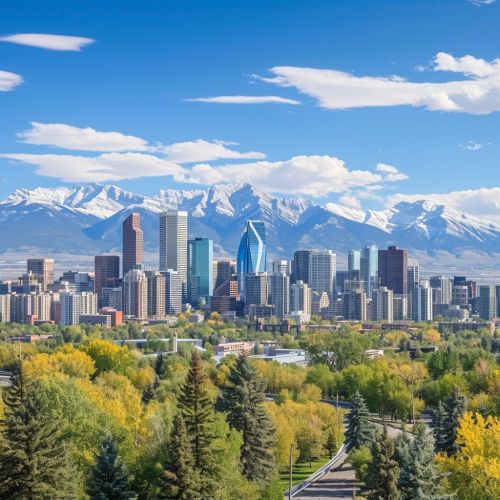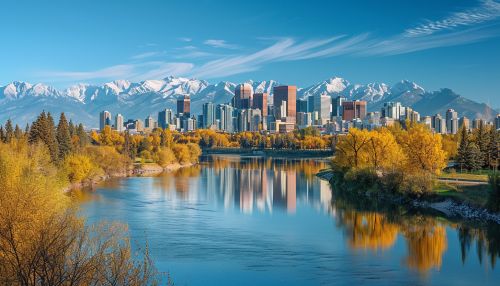Calgary
Geography
Calgary is located in the southern part of the province of Alberta, Canada, at the confluence of the Bow River and the Elbow River. The city is approximately 80 kilometers east of the front ranges of the Canadian Rockies. Calgary's elevation is approximately 1,048 meters (3,438 ft) above sea level downtown, and 1,083 meters (3,553 ft) at the airport.


History
Calgary's history is a rich tapestry of events and people that have shaped the city into what it is today. The area was first inhabited by pre-Clovis people, whose presence has been traced back at least 11,000 years. The city itself was established as Fort Brisebois by the North-West Mounted Police, now the Royal Canadian Mounted Police, in 1875. The fort was renamed Fort Calgary in 1876 by Colonel James Macleod. It was named after Calgary on the Isle of Mull, Scotland.
Economy
Calgary's economy is diverse and dynamic, with a strong focus on the energy, financial services, film and television, transportation and logistics, technology, manufacturing, aerospace, health and wellness, retail, and tourism sectors. The city is home to many oil and gas companies, and it's the financial services capital of western Canada. Calgary is recognized as a global leader in the oil and gas industry and a leader in the Canadian economy.
Demographics
As of the 2016 census, the City of Calgary had a population of 1,239,220 residents, representing 29% of Alberta's total population. The city's population is diverse, with a large number of immigrants. According to the 2016 census, over 28% of residents identified as a visible minority. The city is also known for its young and energetic population; the median age is 36.4 years, making it one of the youngest cities in Canada.
Culture
Calgary is known for its vibrant arts scene, with numerous theatres, art galleries, and concert halls. The city is home to several major performing arts and culture festivals, including the Calgary International Film Festival, the Calgary Folk Music Festival, and the world-renowned Calgary Stampede, which attracts over a million visitors every year.
Education
Calgary is home to several post-secondary institutions, including the University of Calgary, Mount Royal University, and SAIT Polytechnic. The city's primary, secondary, and post-secondary institutions are recognized for their commitment to education and research, contributing to Calgary's reputation as a hub for innovation and learning.
Transportation
Calgary is served by a variety of transportation options, including the Calgary International Airport, the Calgary Transit public transportation system, and an extensive network of pedestrian and bicycle paths. The city's transportation infrastructure is designed to support a growing population and to accommodate the city's geographic spread.
Sports
Calgary has a rich sports culture, with a number of professional and amateur sports teams, including the Calgary Flames of the National Hockey League and the Calgary Stampeders of the Canadian Football League. The city also hosted the 1988 Winter Olympics, the first Canadian city to do so.
